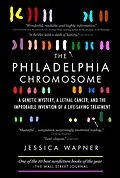One of The Wall Street Journal's 10 Best Nonfiction Books of the Year
Philadelphia, 1959: A scientist scrutinizing a single human cell under a microscope detects a missing piece of DNA. That scientist, David Hungerford, had no way of knowing that he had stumbled upon the starting point of modern cancer research? the Philadelphia chromosome. It would take doctors and researchers around the world more than three decades to unravel the implications of this landmark discovery. In 1990, the Philadelphia chromosome was recognized as the sole cause of a deadly blood cancer, chronic myeloid leukemia, or CML. Cancer research would never be the same.
Science journalist Jessica Wapner reconstructs more than forty years of crucial breakthroughs, clearly explains the science behind them, and pays tribute?with extensive original reporting, including more than thirty-five interviews?to the dozens of researchers, doctors, and patients with a direct role in this inspirational story. Their curiosity and determination would ultimately lead to a lifesaving treatment unlike anything before it.
The Philadelphia Chromosome chronicles the remarkable change of fortune for the more than 70,000 people worldwide who are diagnosed with CML each year. It is a celebration of a rare triumph in the battle against cancer and a blueprint for future research, as doctors and scientists race to uncover and treat the genetic roots of a wide range of cancers.
Autorentext
Jessica Wapner is a journalist and former science editor at Newsweek whose work has appeared in The New Yorker, The New York Times, Wired, Medium, Discover, Popular Science, Self, Scientific American, New York magazine, The Atlantic, and elsewhere. Her first book, The Philadelphia Chromosome, was named a top ten nonfiction book by The Wall Street Journal. She lives in Brooklyn.
Author of One Renegade Cell: How Cancer Begins, and The Biology of Cancer, Robert Allan Weinberg is a Daniel K. Ludwig Professor for Cancer Research at MIT and American Cancer Society Research Professor; his research is in the area of oncogenes and the genetic basis of human cancer. Weinberg is also affiliated with the Broad Institute and is a founding member of the Whitehead Institute for Biomedical Research.
Klappentext
The discovery of a cancer-causing genetic mutation leads to a lifesaving miracle drug in this "absorbing, complex medical detective story" (Kirkus Reviews). Philadelphia, 1959. A scientist scrutinizing a single human cell detects a missing piece of DNA. That scientist, David Hungerford, has just stumbled on the starting point of modern cancer research?the Philadelphia chromosome. It would take doctors and researchers around the world more than three decades to unravel the implications of this landmark discovery. In 1990, the Philadelphia chromosome was recognized as the sole cause of a deadly blood cancer, chronic myeloid leukemia, or CML. Cancer research would never be the same. With extensive research and numerous personal interviews, science journalist Jessica Wapner reconstructs the decades-long journey from Hungerford's discovery to a breakthrough, lifesaving treatment. A chronicle of scientific rigor and determination, The Philadelphia Chromosome celebrates a rare triumph in the battle against cancer while offering a blueprint for future research. One of The Wall Street Journal's 10 Best Nonfiction Books of 2013
